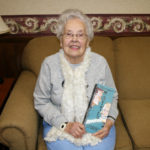Father Guillermo Trevino’s parents, Guillermo and Maria, each emigrated from Mexico to the United States to find work and a better life. They met at a sporting event in San Antonio, Texas, and married in the mid-1980s. Their first-born child, Guillermo Jr., became a priest for the Diocese of Davenport four years ago. If Guillermo Sr. (deceased) and Maria had been turned away at the border or deported, the diocese would have one less priest serving the people.
How many other potential priests, teachers, health care providers, lawyers, police officers, firefighters, EMTs and construction workers are we losing because of our federal government’s aggressive, nativist immigration policies?
Not every male immigrant who enters the United States will become a priest, but more of our parishes would face closure in the future if it weren’t for immigrants who cherish and practice their Catholic faith here. An examination of conscience is in order. What are we afraid of? That someone who looks different than we do will take over leadership roles in our country? That we will have to give up our way of life? Our cultures and traditions? Is that how Americans felt when Irish citizens arrived in droves from the old sod because of famine and oppressive leaders?
“Lord have mercy … Christ have mercy,” we pray every weekend at Mass. We ask for mercy from our God. Why can’t we extend that gift of mercy to women, children and men who have the same hopes and dreams that we do: to live a fulfilling, productive life in a thriving society. Tell Congress to make it more possible for them to be in this country legally.
Instead, we read newspaper headlines or social media feeds about unjust rules which collectively are leading to the dehumanization of immigrants from south of the border. “These people,” on the surface, appear to our government to be takers not givers.
That’s not true. Ask the immigrant workers whose lives were upended last year while they were on the job in Mount Pleasant. Following the Immigration Customs and Enforcement (ICE) raid in May 2018 at the Midwest Precast Concrete factory, eight men were deported. Twenty-four men paid thousands of dollars to bond out of immigration detention and have been awaiting court hearings at home, with their families. Those hearings are scheduled throughout 2019 and into 2020.
Some have been allowed to apply for work permits. One of the men, a father, received his work permit and is excited to work again, pay taxes and support his young family, according to an Iowa WINS report published earlier this summer. “Most of the men were the primary wage earners for their families. The women and children left behind have had a significant loss of income and suffered emotional hardships.”
One of the parishes that Fr. Trevino serves is in West Liberty and has a large Spanish-speaking population. In the town itself, the superintendent of schools is a Latino and one of the bank’s vice presidents is a Latina. They serve in those positions because of their leadership abilities.
Embracing difference begins by making the effort to get to know someone who is different. Listen to their story. We’re less likely to be resentful toward someone we get to know. Fr. Trevino participates in the West Liberty Youth Dream Catchers program in which community leaders mentor at-risk students. Every Sunday at 3 p.m., he goes to the public library to read books and play video games with students. “That’s what we’re called to do as Catholics,” Fr. Trevino said, to accompany one another.
Catholics need to go out and encounter others, as Pope Francis calls them to do, Bishop Thomas Zinkula told the Diocesan Pastoral Council earlier this month. So, participate in international festivals and other cultural events hosted by people of different ethnic groups. Check with the chamber of commerce about opportunities to mentor immigrants in schools or community programs. Contact members of Congress (congress.gov/members) and ask them to pass long overdue immigration law that is just, fair and nondiscriminatory.
Remember, the immigrants we welcome to the United States could be a priest to serve our diocese, a health care provider to help us heal or emergency responders to come to our aid. But, more importantly, they are our brothers and sisters in Christ, made in the image of God.
Barb Arland-Fye, Editor
(arland-fye@davenportdiocese.org)











